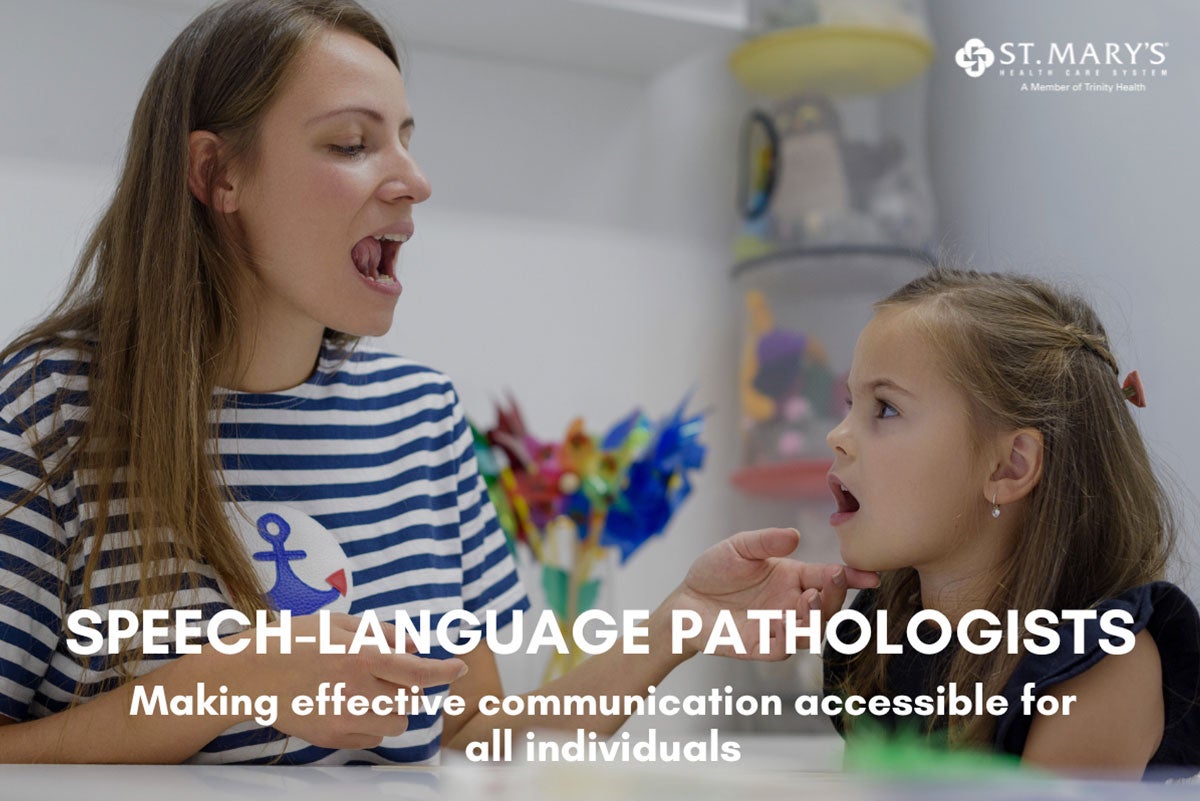What Does a Speech Language Pathologist Do?
April 17, 2023Speech pathologists focus on making effective communication accessible for all individuals
Who Are Speech-Language Pathologists?
A speech-language pathologist, also known as SLPs, are rehabilitation professionals who specialize in communications and swallowing.
SLPs work with a multitude of individuals, ranging in age from newborns to those over 100. Speech-language pathologists work in collaboration with a rehabilitation team that can include physical therapists, occupational therapists, audiologists, and psychologists.
SLPs can work in a range of settings such as:
- Hospitals
- Physicians’ offices
- Schools/Universities
- Private Clinics
- Nursing Homes
- Rehabilitations Centers
What Does an SLP Focus On?
They work with patients on a broad range of physical and cognitive communication disorders such as issues with articulation, stuttering, semantics, syntax, phonics, vocalization, and swallowing. These difficulties can arise from a variety of causes such as autism, stroke, brain injury, hearing loss, developmental delay, and more. They can also treat swallowing difficulties.
Speech Issues
- Fluency: This refers to how sounds, syllables, words, and phrases combine when speaking quickly. Fluency-related disorders can include cluttering and stuttering.
- Voice: Voice difficulties can include hoarseness – which can be created by nodules or polyps on the folds – as well as an abnormal pitch.
- Articulation: Articulation disorders include issues such as substitution of one sound for another and slurring.
Language Problems
- Aphasia: This is typically caused by a stroke or head trauma. Aphasia is the inability to understand or create language due to damage of certain areas of the brain.
- Language-based learning disabilities: This can affect skills such as listening, reasoning, speaking, reading, and writing.
- Pragmatics: SLPs work with individuals who have difficulty understanding social cues and communication rules, such as taking turns.
Related Disorders
- Swallowing: Dysphagia, a swallowing disorder, can have consequences such as poor nutrition and unhealthy weight loss. This can occur in children and adults.
- Hearing loss: SLPs can treat individuals with hearing loss by helping them develop lip-reading skills and other forms of effective communication.
Due to the varying nature of the job, speech-language pathologists need to be good at working with all types of clients and situations. A skilled speech-language pathologist is caring, resourceful, and able to develop individualized plans tailored to each patient’s needs.
Does St. Mary’s offer SLP care?
Yes! St. Mary’s offers SLP services in a wide range of settings to meet the needs of patients across our continuum of care:
- Inpatient nursing units at St. Mary’s Hospital in Athens and St. Mary’s Good Samaritan Hospital in Greensboro
- Center for Rehabilitative Medicine at St. Mary’s Hospital
- Swing Bed Program at Good Samaritan Hospital
- Outpatient services at St. Mary’s Outpatient Center on Daniells Bridge Road near Bogart and at Good Samaritan Hospital
- Home Health Care/Palliative Care/Hospice Services in homes across a 14-county region of Northeast Georgia
What should I do if I or someone I love needs speech-language therapy?
Talk to your doctor to ask for a referral for an SLP evaluation. You can choose where to receive SLP care, so ask your doctor to refer you to St. Mary’s. If your initial evaluation shows you need and would benefit from SLP care, our speech-language pathologist will work with you to develop a treatment plan.

